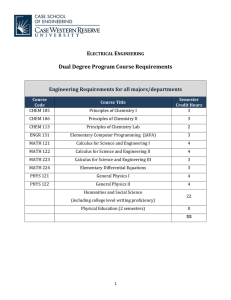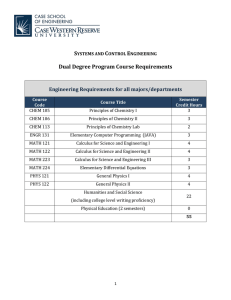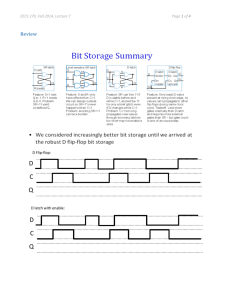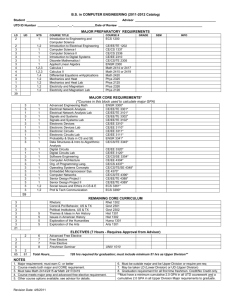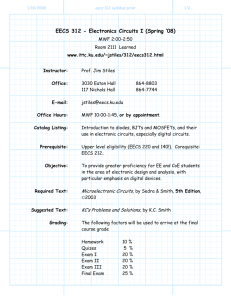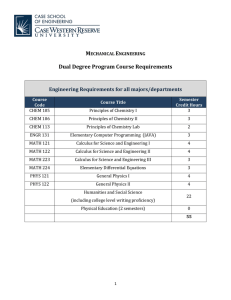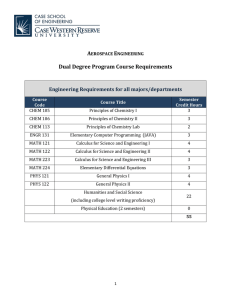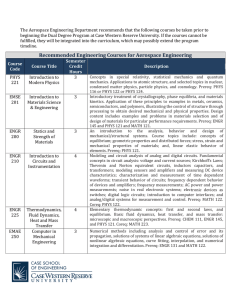C E Dual Degree Program Course Requirements
advertisement
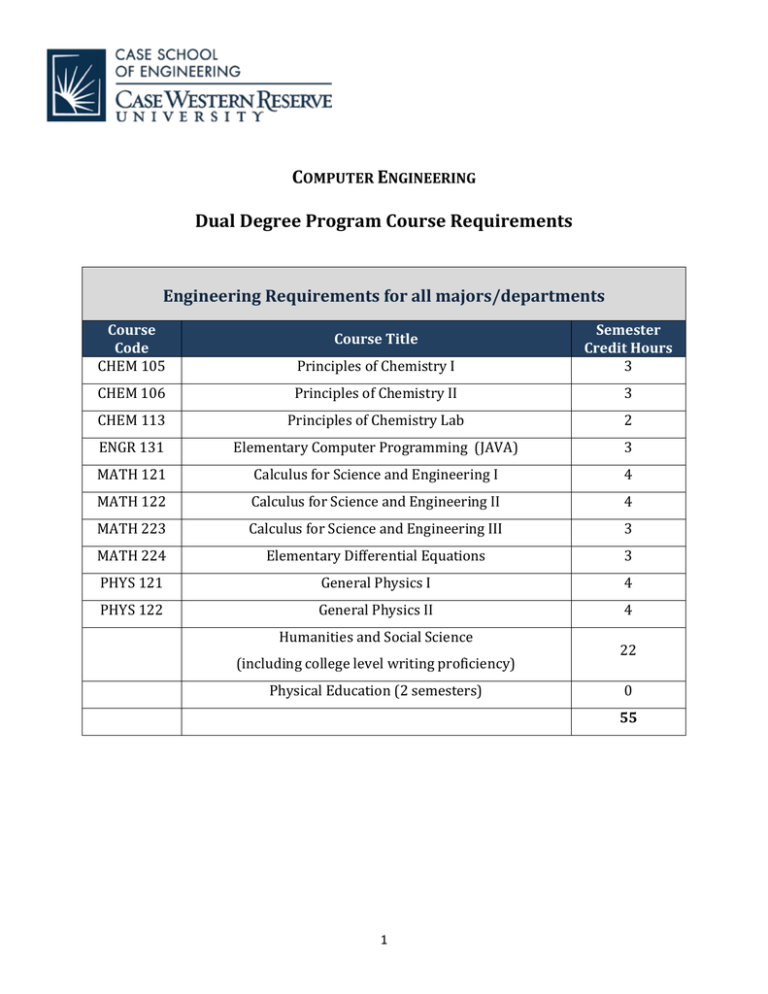
COMPUTER ENGINEERING Dual Degree Program Course Requirements Engineering Requirements for all majors/departments Course Code CHEM 105 Principles of Chemistry I Semester Credit Hours 3 CHEM 106 Principles of Chemistry II 3 CHEM 113 Principles of Chemistry Lab 2 ENGR 131 Elementary Computer Programming (JAVA) 3 MATH 121 Calculus for Science and Engineering I 4 MATH 122 Calculus for Science and Engineering II 4 MATH 223 Calculus for Science and Engineering III 3 MATH 224 Elementary Differential Equations 3 PHYS 121 General Physics I 4 PHYS 122 General Physics II 4 Course Title Humanities and Social Science (including college level writing proficiency) Physical Education (2 semesters) 22 0 55 1 The Computer Engineering Department recommends that the following courses be taken prior to beginning the Dual Degree Program at Case Western Reserve University. If the courses cannot be fulfilled, they will be integrated into the curriculum, which may possibly extend the program timeline. Recommended Engineering Courses for Computer Engineering Semester Credit Description Hours Maxwell’s integral and differential equations, boundary conditions, 3 Course Code Course Title EECS 309 Electromagnetic Fields I ENGR 210 Introduction to Circuits and Instrumentation 4 ENGR 200 Statics and Strength of Materials 3 ENGR 225 Thermodynamics, Fluid Dynamics, Heat and Mass Transfer Statistics for Engineering and Science 4 STAT 312 3 constitutive relations, energy conservation and Pointing vector, wave equation, plane waves, propagating waves and transmission lines, characteristic impedance, reflection coefficient and standing wave ratio, indepth analysis of coaxial and strip lines, electro- and magneto-quasistatics, simple boundary value problems, correspondence between fields and circuit concepts, energy and forces. Prereq: MATH 223 and PHYS 122. Coreq: MATH 224. Modeling and circuit analysis of analog and digital circuits. Fundamental concepts in circuit analysis: voltage and current sources; Kirchhoff’s Laws; Thevenin and Norton equivalent circuits, inductors capacitors, and transformers; modeling sensors and amplifiers and measuring DC device characteristics; characterization and measurement of time dependent waveforms; transient behavior of circuits; frequency dependent behavior of devices and amplifiers; frequency measurements; AC power and power measurements; noise in real electronic systems; electronic devices as switches; digital logic circuits; introduction to computer interfaces; and analog/digital systems for measurement and control. Prereq: MATH 122. Coreq: PHYS 122. An introduction to the analysis, behavior and design of mechanical/structural systems. Course topics include: concepts of equilibrium; geometric properties and distributed forces; stress, strain and mechanical properties of materials; and, linear elastic behavior of elements. Prereq: PHYS 121. Elementary thermodynamic concepts: first and second laws, and equilibrium. Basic fluid dynamics, heat transfer, and mass transfer: microscopic and macroscopic perspectives. Prereq: CHEM 111, ENGR 145, and PHYS 121. Coreq: MATH 223. For advanced undergraduate students in engineering, physical sciences, life sciences. Comprehensive introduction to probability models and statistical methods of analyzing data with the object of formulating statistical models and choosing appropriate methods for inference from experimental and observational data and for testing the model’s validity. Balanced approach with equal emphasis on probability, fundamental concepts of statistics, point and interval estimation, hypothesis testing, analysis of variance, design of experiments, and regression modeling. Note: Credit given for only one (1) of STAT 312, 313, 333, 433. Prereq: MATH 122 or equivalent. 2 Sample Course Sequence for Computer Engineering Fall Year 1 Subject Course Code Number ENGL 398N ENGR 210 EECS 281 EECS 233 MATH 304 Course Title Professional Communication Circuits and Instrumentation Computer Org. Logic Design Introduction to Data Structures Discrete Math Hours per Week Class Lab 3 0 3 2 3 2 3 2 3 0 15 6 Spring Year 1 Subject Course Course Title Code Number ENGR 225 Thermo, Fluid Dynamics, Heat & Mass Transfer EECS 315 Digital Systems Design EECS 337 Systems Programming EECS 314 Computer Architecture Fall Year 2 Subject Course Code Number EECS 301 EECS 318 Spring Year 2 Subject Course Code Number ENGR 200 STAT 312 EECS 398 Course Title Digital Electronics Laboratory VLSI/CAD (or) EECS 338 Operating Systems Approved Technical Elective Approved Technical Elective Approved Technical Elective Hours per Week Class Lab 4 0 3 2 3 2 3 0 13 4 Hours per Week Class Lab 0 4 3 2 3 1 3 0 3 0 3 0 12 6 (or 5) Course Title Statics and Strength of Materials Statistics for Engineering and Science Engineering Projects I Approved Technical Elective Approved Technical Elective Semester Credit Hours 3 4 4 4 3 18 Semester Credit Hours 4 4 4 3 15 Semester Credit Hours 2 4 4 3 3 3 15 Hours per Week Class Lab 3 0 3 0 0 8 3 0 3 0 12 8 Semester Credit Hours 3 3 4 3 3 16 Please Note: The course sequence serves as an example of the classes necessary to complete the Dual Degree Program. Courses and the semesters taken will be based on the student’s transfer credit and discussion with the Case Western Reserve University faculty advisor. 3
